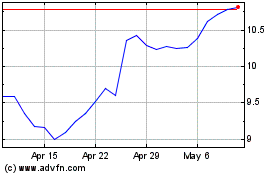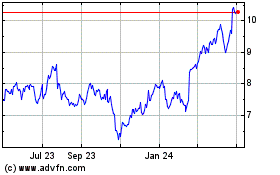By Liz Hoffman and Telis Demos
When two of Europe's corporate titans sat down to negotiate a
merger this year, they called American banks.
Fiat Chrysler Automobiles hired Goldman Sachs Group Inc. as its
lead adviser. France's Renault SA hired a boutique bank stacked
with Goldman alumni. In a deal that would reshape Europe's auto
industry, the continental banks that had sustained Fiat and Renault
for more than a century were muscled aside by a pair of Wall Street
deal makers.
A decade after fueling a crisis that nearly brought down the
global financial system, America's banks are ruling it. They earned
62% of global investment-banking fees last year, up from 53% in
2011, according to Coalition, an industry data provider. Last year,
U.S. banks took home $7 of every $10 in merger fees, $6 of every
$10 in stock commissions, and $6 of every $10 paid to hold and move
corporate cash.
Europe's banks are smaller, less profitable and beating a hasty
retreat from Wall Street. Germany's Deutsche Bank AG is firing
thousands of investment bankers. Switzerland's UBS Group AG
abandoned its huge trading floor in Stamford, Conn., to refocus on
its roots as a private bank.
Barclays is the lone holdout with an ambition to be a universal
global bank. Under Chief Executive Jes Staley, an American who rose
to prominence at JPMorgan Chase & Co., the bank has resisted
shareholder calls to go back to its roots serving British consumers
and companies.
From their central perch in London and with close ties to
developing countries, Europe's banks were primed to benefit as
financial services went global. They charged onto Wall Street in
the 1990s and pressed their advantage as U.S. banks limped out of
the 2008 crisis.
Then, "they handed the whole system on a platter to the
Americans," said Colm Kelleher, the Irish-born former Morgan
Stanley executive.
Coming out of the crisis, U.S. banks quickly raised capital and
shed risk, unpleasant tasks that Europeans put off. American
businesses recovered quickly, and its consumers are eager to borrow
and spend. A tax cut in 2018 boosted profits. Interest rates have
risen.
Meanwhile in Europe, regional economies are sputtering and
borrowing has slowed.
Central bankers have cut interest rates below zero, which leaves
banks struggling to eke out a profit on loans. Banking policy in
Europe remains fractured, with national and continental regulators
pursuing often conflicting agendas.
"It is not our remit to promote national, or even European,
champions," said Andrea Enria, the European Central Bank's top
banking regulator.
Twenty-five years ago, European banks charged into the U.S. They
bought storied firms like Donaldson, Lufkin & Jenrette and
Wasserstein Perella and dangled big paydays for rainmakers. When
Deutsche Bank announced a $10 billion takeover of Bankers Trust in
1998, it promised at least $400 million in bonuses to retain top
bankers.
The challenges of merging a conservative European commercial
lender and a U.S. derivatives shop gave competitors pause.
Goldman's CEO, Hank Paulson, shared his doubts with a hotel
ballroom of his bankers: Deutsche Bank "just signed up for 10 years
of pain," attendees remember him saying.
But in an era of cheap debt and light regulation, the land grab
seemed to pay off. Deutsche Bank had a $3 trillion balance sheet in
2007 and that year earned twice as much as Bank of America Corp. in
securities-trading. Royal Bank of Scotland was briefly the largest
bank in the world, wielding a balance sheet bigger than Britain's
entire economy.
Even the financial crisis looked at first like an opportunity.
When Barclays PLC bought Lehman Brothers in a fire sale, it got
10,000 of the firm's U.S. bankers and few of its bad debts. On
Lehman's Times Square trading floor, the loudspeakers played "God
Save The Queen." Deutsche Bank pounced on Wall Street's
clients.
The high-water mark was in 2011, when global investment-banking
fees were roughly split between European and U.S. firms.
The good times didn't last. A 2012 sovereign-debt crisis across
the continent put new pressure on the region's biggest banks.
Economic growth slowed across the continent. Central bankers turned
interest rates negative in 2014. German media calls them
"Strafzinsen," translating roughly to "penalty rates."
UBS slashed 10,000 jobs and cut big parts of its trading
operation. Royal Bank of Scotland fired thousands of investment
bankers and sold its U.S. retail arm to focus on the U.K.
Three-quarters of the Lehman bankers Barclays picked up in 2008
were gone within five years, according to Financial Industry
Regulatory Authority records.
Meanwhile, U.S. banks were quietly encroaching on European
rivals' territory. In 2009, JPMorgan completed an acquisition of
Cazenove, the U.K. investment bank. Every year since 2014, JPMorgan
has generated more investment-banking revenue across Europe than
anyone else, according to Dealogic. (The London-listed owner of
Peppa Pig, a British cartoon character, hired JPMorgan Cazenove to
advise on its sale in August to U.S. toy giant Hasbro Inc.)
As U.S. banks got stronger and their European rivals weakened,
client loyalties began to change.
Today's companies are increasingly global. They make more of
their money in the U.S. and have swapped a shareholder register
stacked with old-line European families and trusts for the likes of
BlackRock Inc. and other U.S. investment giants, where Wall Street
banks are better connected. The percentage of U.K. companies' stock
owned by foreigners rose from 16% in 1994 to 53% in 2016, according
to government statistics.
Fiat, the Italian car maker that pursued a tie-up with France's
Renault this year, makes two-thirds of its money in the U.S., where
it owns Chrysler. Its shots are called by John Elkann, the New
York-born scion of the family that founded Fiat in 1899.
One of Mr. Elkann's closest advisers is a Goldman Sachs banker
who for the past 15 years has organized a yearly gathering of
European billionaire business owners, according to people who have
attended. They swap stories, share advice and, more often than not,
hire Goldman for deals.
Globalization has cost the Europeans not just on
headline-grabbing mergers, but in the everyday business of managing
money for clients. Deliveroo, a food-delivery startup based in the
U.K., sought to ramp up in Europe and the Middle East. Instead of
hiring local banks in each market, it consolidated its money flows
with Citigroup, which has local licenses in 98 countries and a
global digital platform.
JPMorgan has made a big push to expand transaction banking for
European clients. In 2010 it established a new unit of global
bankers to pitch day-to-day transaction services to big companies,
and later took over dozens of European transaction relationships
from RBS.
Most recently JPMorgan said it is extending its commercial
banking business globally, targeting hundreds of midsize businesses
across Europe. It has sought to take on a more local flavoring,
doing things like sponsoring math-and-science programs for students
in France, Germany and Italy.
Last year, Citigroup and JPMorgan were two of the three biggest
providers of day-to-day transaction banking globally, along with
Britain's HSBC Holdings PLC, according to Coalition. U.S. banks
accounted for 57% of the global transaction-banking revenue pool
among the biggest banks in that business, versus 22% for Europeans,
Coalition said.
--Coulter Jones contributed to this article.
Write to Liz Hoffman at liz.hoffman@wsj.com and Telis Demos at
telis.demos@wsj.com
(END) Dow Jones Newswires
September 04, 2019 05:44 ET (09:44 GMT)
Copyright (c) 2019 Dow Jones & Company, Inc.
Barclays (NYSE:BCS)
Historical Stock Chart
From Mar 2024 to Apr 2024

Barclays (NYSE:BCS)
Historical Stock Chart
From Apr 2023 to Apr 2024
